World Mental Health Day 2020: A 24-hour Virtual March for Mental Health
By Nicole K. Bulanchuk
Published October 9, 2020

Introduction
A first-of-its-kind virtual March for Mental Health was held on this year’s World Mental Health Day, with a wide variety of guest speakers and inspiring messages, divided into diverse topics, presented over a 24-hour period. This report is an overview of that event, its history, details about selected topics, and personal reflections about the importance of the celebration.
History of World Mental Health Day
World Mental Health Day was first observed on October 10, 1992. It was created by then-Deputy Secretary-General of the World Federation for Mental Health (WFMH), American psychiatrist Richard Hunter, as an annual activity of that NGO, consisting of professionals, paraprofessionals and interested individuals devoted to advocacy, education and prevention of mental disorders. Since then, the Day has been commemorated every year on October 10 by the UN, civil society groups and individuals around the world. The first three years of World Mental Health Day were a two-hour telecast broadcasted globally from the United States information agency satellite system in Tallahassee, Florida, with board members able to participate from other countries, like Australia, Chile, England, Zambia, Geneva and Mexico City. During the first broadcast, people from Swaziland called in, and viewed the program, unannounced and unanticipated, proving to WFMH leaders that their initiative was far-reaching and significant.
The aims of the celebration have always been to promote mental health advocacy and educate the public on relevant issues in mental health. The first theme was identified in 1994, called, “Improving the Quality of Mental Health Services throughout the World.” Feedback reports came in from 27 countries, especially Australia and England, leading to more excitement about the project, that within the next three years became a valuable occasion for nations, NGOs, and all people around the world, to learn about and commit to improving, mental health care and access for everyone.
Since 1994, the yearly themes have covered a wide range of topics, e.g., women, children, human rights, chronic physical illnesses and diversity. This year’s theme was “Mental Health for All Greater Investment – Greater Access.” (WFMH, 2020). The World Health Organization (WHO) has also sponsored the events every year, such as “Dignity in Mental Health” in 2015, “Psychological First Aid” in 2016 “Mental Health in the Workplace” in 2017, “Young People and Mental Health are Changing” in 2018 and “Focus on Suicide Prevention” in 2019.
World Mental Health Day 2020 and COVID-19
The theme of this year’s World Mental Health Day was inspired by the unprecedented mental health consequences and detrimental impact of the COVID-19 pandemic on billions of people around the world. WFMH President Dr. Ingrid Daniels said, “Now more than ever greater investment in mental health is needed to ensure that everyone, everywhere has access to mental health care… Mental health is an investment and not an expense and should be prioritized to avert a further catastrophe” (Merlo, 2020).
In my view, Daniels is right. Without a doubt, as a society we must invest in mental health especially given the impact of the deadly pandemic.
Statistics prove this. As of October 2020, COVID-19 has caused over 1 million deaths, with over 38.5 million cases worldwide (Worldometer, 2020). Tangible consequences of COVID-19 include isolating lockdown measures, ongoing death and illness, job loss, financial hardship, and food insecurity, all of which have taken a toll on populations and added to an already existing mental health crisis. According to the WHO World Health Report (2001), about 1 in 4, or more than 450 million people, live with mental disorders, constituting one of the leading causes of ill-health and disability worldwide. These heartbreaking statistics are predicted to be escalated in the aftermath of the COVID-19 pandemic.
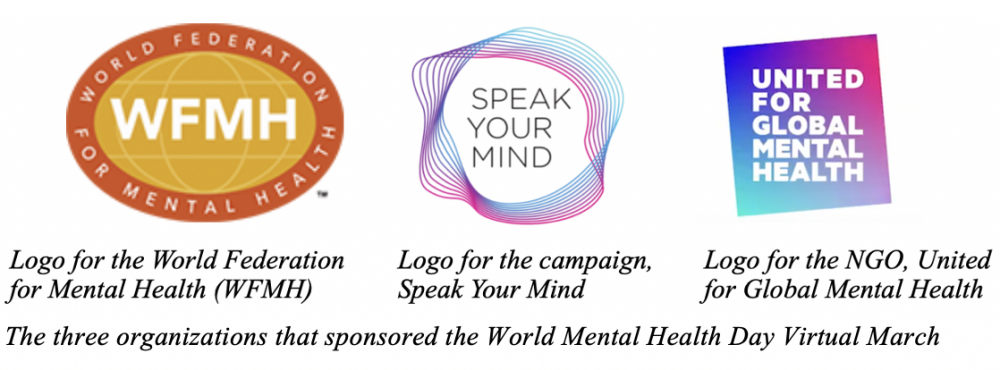
Virtual March for Mental Health Event Overview
In commemoration of this year’s World Mental Health Day, considering COVID-19 safety guidelines, the NGO, United for Global Mental Health (UnitedGMH), and their advocacy campaign “Speak Your Mind” created and hosted the world’s first Virtual March for Mental Health on October 9 through October 10, 2020 (Speak Your Mind, 2020). As part of their #MoveforMentalHealth campaign, UnitedGMH and “Speak Your Mind” collaborated with multiple NGOs, leaders and experts in the field, and the United Nations, to form the 24-hour worldwide virtual event.
The march was livestream broadcasted for 24 hours on Speak Your Mind’s Facebook Live and UnitedGMH’s YouTube Channel. There were 24 separate hours or segments, with each hour representing a different country and their specific mental health concerns, or an issue in mental health. Speakers represented all regions of the world, including the United States, Tonga, New Zealand, Australia, Indonesia, Philippines, Nepal, India, Sri Lanka, Pakistan, South Africa, Nigeria, Sierra Leone, Liberia, Ghana, Argentina, and Peru. The issues covered in the hours included Humanitarian Crises, Dementia, Suicide Prevention, Inclusion, Youth, LGBTQI+, and the NGO called “Project Unsung”. The entire event can be viewed on Speak Your Mind’s Facebook and UnitedGMH’s YouTube channel (links provided at the end of this report).
“Speak Your Mind” is a global citizen-led campaign platform within UnitedGMH with the goal to provoke progress in mental health in every nation around the world. Currently, people from 19 countries are part of “Speak Your Mind” and have pledged to take urgent action on mental health and demand that their government leaders invest in mental health.
United for Global Mental Health (UnitedGMH) is a membership of organizations and individuals who advocate for mental health access and care around the world.
I first learned about UnitedGMH and the Virtual March for Mental Health event during Dr. Judy Kuriansky’s course, Psychology and the United Nations, at Teachers College, Columbia University. During our class on Advocacy, discussing how to be an effective advocate for mental health, we were introduced to Sarah Kline, Co-Founder and Deputy CEO for UnitedGMH, and Christie Kesner, a Policy Consultant for UnitedGMH. Sarah gave the class an overview of United for Global Mental Health network, its value for members, and the upcoming events. Christie spoke about her role in fundraising role for UnitedGMH, and spoke enthusiastically about the event. I was immediately intrigued and committed to being part of the movement.
In the following sections of this report, I detail five of the hours I found most interesting and meaningful that I attended during the 24- hour Virtual March for Mental Health.
Youth and Mental Health
The hour about “Youth and Mental Health” began with the touching story of Dr. Naeem Dalal, a young Zambian medical doctor, mental health expert and “Global Shaper”. A Global Shaper is a person nominated before 30 years old to be involved with a network of people who drive action, change and dialogue in many different issues involving mental health awareness. He described his struggle as a son of a father who had mental illness throughout his entire life. When he was just seven years old, Naeem’s mother told him she was suicidal because of the difficulties she had with his father. Because of these mental health struggles and the need for more access to mental health care, his parents, originally from rural Zambia, relocated in the 1990s to Lusaka, the capital and largest city of Zambia. Since his mother was often preoccupied with his father’s episodes, Naeem was raised by his siblings.
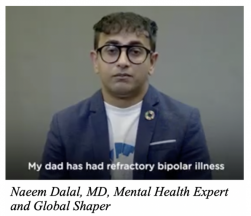 Eventually, Naeem was accepted into medical school but during his third year, his father became very unwell and as a result, Naeem missed a lot of school and exams and was excluded from his program. Disheartened and outraged that he could be removed from his program because of mental illness, he appealed the exclusion. The University of Zambia (UNZA) Senate allowed him to re-enter when he showed proof of his father’s illness. As in this experience and throughout his entire life, the stigma and difficulties of his father’s illness made life more challenging for him and his family.
Eventually, Naeem was accepted into medical school but during his third year, his father became very unwell and as a result, Naeem missed a lot of school and exams and was excluded from his program. Disheartened and outraged that he could be removed from his program because of mental illness, he appealed the exclusion. The University of Zambia (UNZA) Senate allowed him to re-enter when he showed proof of his father’s illness. As in this experience and throughout his entire life, the stigma and difficulties of his father’s illness made life more challenging for him and his family.
The hour I watched continued with remarks from a few students.
The next speaker was Anjali Singla, a mental health professional from India and representative from Banyan, an NGO based in Chennai, India, that helps people experiencing homelessness and mental illness. Singla discussed her own struggles with mental illness, especially during her first year of undergraduate education when she developed severe depression and anxiety, was unsure about herself, and confused about how to identify and place herself in society. At one point, she experienced suicidal thoughts and planned her death. This presented added problems since in her country of India, mental illness is prevalent, but mental health care is scarce. While 150 million people need mental health care in India, only about 30 million people receive it, given that there is only one psychiatrist for about 100,000 people. She pointed out that this lack of access to care is more than a mental health issue, it’s a public health issue, especially in India. Singla highlighted that she was one of the lucky ones to receive medication and treatment for her mental health challenges.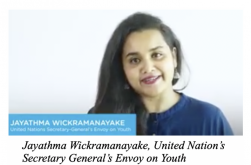
I was impressed to hear from the Secretary-General Envoy on Youth at the United Nations, Jayathma Wickramanayake, who is the spokesperson in behalf of youth on all issues of the United Nations agenda. What a amazing role, that has such impact. She remarked about the prevalence of mental health issues in youth.
“Mental health is at the core of humanity,” Wickramanayake said, adding that physical and mental health are connected, but mental health is more neglected. She stated that one billion people have been diagnosed with a mental illness and one person every 40 seconds dies by suicide. Suicide is the 2nd leading cause of death globally and over 25% of those deaths are in the age group 15-29 years old. She emphasized that now more than ever, world leaders must take action and invest in the mental health of youth. This starts with affordable community-based health treatment. Young people deserve a seat at the table, she said, because we will all benefit when the mental health of youth is healed.
LGBTQI+ and Mental Health
In a segment of the march taking place in Nairobi, Kenya, Ms. Yvonne Wamari, Africa Program Coordinator of the NGO Outright Action International, spoke about the LGBTQI+ community and mental health. The NGO fights against human rights violations and abuses against LGBTQI+ individuals around the world. She spoke eloquently about the discrimination and mental 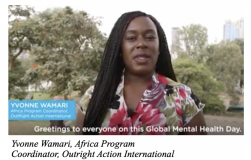 health issues that LGBTQI+ individuals experience; including significantly higher levels of depression, anxiety, suicidal ideation and stress compared to the broader population. In fact, 70% of transgender and nonbinary people experience depression, and over 50% of LGBTQI+ youth have contemplated suicide -- that number comprising literally every other young LGBTQI+ person.
health issues that LGBTQI+ individuals experience; including significantly higher levels of depression, anxiety, suicidal ideation and stress compared to the broader population. In fact, 70% of transgender and nonbinary people experience depression, and over 50% of LGBTQI+ youth have contemplated suicide -- that number comprising literally every other young LGBTQI+ person.
After giving these prevalence rates, Wamari explained why there is so much hardship for this population. Her reason: LGBTQI+ individuals, to this day, remain the most marginalized, discriminated and hated in the world. “LGBTQI+ people are seen as somehow deviant, threatening and pathological” she said. There has been some progress in recognizing and accepting LGBTQI+ people, Wamari said. For example, the African countries of Botswana and Angola, and the country of India have abolished all of their inhumane laws, and over 40 countries recognize same-sex partnership.
Also, progress is evident in the fact that recently, marriage equality became a reality in Costa Rica, Ecuador and Taiwan; yet, 67 countries still criminalize same-sex marriage, and up to 12 countries impose the death penalty for these unions.
But there is still much more to be done.
In too many places, she said, LGBTQI+ people are seen as criminals who deserve punishment and death for whom they choose to love and how they choose to express themselves. Wamari explained, colonial-era laws criminalizing same-sex marriages were created to protect “traditional values” which people are afraid to break.
Furthermore, “LGBT-free zones” are being introduced and championed in Poland and legal gender recognition has been banned in Hungary. In 2014, Nigeria introduced the “Same Sex Marriage Prohibition Act” which restricts a people who are LGBTQTI+, their allies, and supportive NGOs, from being who they are and being with whom they love. Even in the United States, where marriage equality became a reality for all 50 states in 2015, protections for transgender people have been removed.
Given these negativities,, said Wamari, the fight for equality must continue.
Similarly damaging, she pointed out, programs that promote ways to “change,” including conversion therapy, reparation therapy, or “gay cure,” are prevalent around the world. Conversion therapy explains the “depths of unacceptance of LGBTQ” and, “amplifies mental health issues that cause deep irreplaceable lifelong harm,” she explained.
In reaction, her NGO, called Outright Action International, released a first-ever report on these harmful practices, their prevalence and impact. The report shows that there are only five countries in the world where conversion therapy is illegal; thus, these practices are pervasive, largely motivated in the name of religion and pseudo-science. As a result, the Outright NGO has also launched a project to identify and eliminate conversion therapy in three countries in Africa, namely, Kenya, Nigeria and South Africa. In Nigeria, their report revealed that half of the LGBTQI+ people surveyed have experienced conversion practices including beatings, exorcisms, corrective rape, and other forms of torture to change them. In South Africa, conversion practices are traditional and cultural and include forced marriages or imitation schools. In Kenya, conversion therapies are mainly family-driven -- encouraged by the family of the LGBTQI+ person – and include requirements to practice excessive prayer and purity practices.
Wamari ended her presentation saying that conversion practices do not work and that LGBTQI+ people cannot, and do not need to, be converted. Efforts otherwise create a deep lasting trauma for LGBTQI+ people, she said, adding that no one in the world deserves this type of torture and harm.
Humanitarian Crises and Mental Health
The hour of the March for Mental Health event that was devoted to “Humanitarian Crises and Mental Health” began with a statement by Robert Mardini, Director-General of the International Committee of the Red Cross. He reported that more than 1 in 5 people in conflict zones have some form of mental health condition, which is three times more than the general global population. Further, the pandemic has exacerbated these psychological issues, especially in conflict zones. He demanded that governments and the United Nations invest in local and national professionals and continue to stand with these people and provide mental health support.
The next speaker was Dr. Unni Krishnan, Humanitarian Director for the NGO War Child Holland. War Child Holland is an NGO that empowers children worldwide and works exclusively to improve the resilience and wellbeing of children living with violence and armed conflict.
“Unfortunately the policy makers and donors do not consider addressing the mental health and psychosocial needs in disasters, conflicts and disease outbreaks as a priority,” said Dr. Krishnan. He explained that the Ebola Virus Outbreak in West Africa in 2014 first revealed how much mental health is compromised by deleterious physical health, and that early action is critical to saving people’s li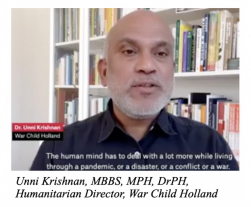 ves.
ves.
Dr. Krishnan further explained that basic psychosocial services in the early stages of a crisis can go a long way to reduce the number of people who will need specialized therapeutic and expensive care. He stated that severe mental illnesses are projected to cost the global economy USD$16 trillion by the year 2030. In contrast, lower-and middle-income countries spend less than USD$2 on mental health per person annually. The overall objective of psychosocial work, he said, should be to “bolster income and condense, protect rights and provide basic services.” Even though these services should never be replacements for primary needs like clean water, hygiene, education, jobs and food, especially since psychiatric counseling sessions will not help if people are hungry, sick, dehydrated, or forced into child labor. “The point is to make mental health and psychosocial support as a complementary ingredient,” he said, “and not a substitute”. 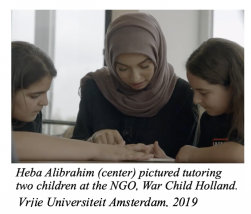
Following up on Dr. Krishnan’s comments, Ms. Heba Alibrahim, who works with War Child Holland, told her inspiring personal story. When just 15 years old, Alibrahim had to flee the civil war in Syria. Now, seven years later, she is studying psychology at the Vrije Universiteit in Amsterdam. During her time in Syria, as a young child, she became familiar with the smell and sight of death, and lives with a lot of trauma after hearing screaming, seeing violence and death and experiencing fear. She noted that her story is not uncommon, since more than 84 million children worldwide have experienced emotional and social problems as a result of war and violence and for 95-99% of these children there is no mental health support. This motivated her to study psychology and help survivors like herself. As part of her work with War Child Holland, Alibrahim campaigns to draw attention to the mental health needs of the people she left behind in Syria, with determination to change the lives of all children who are survivors of war.
T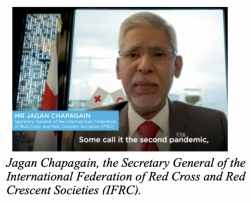 he next remarks were from Mr. Jagan Chapagain, Secretary-General of the International Federation of Red Cross and Red Crescent Societies (IFRC), who explained how the Coronavirus pandemic has worsened mental health issues and made treatments scarcer. He praised healthcare staff and volunteers, who face a triple burden of vulnerability: (1) long hours, (2) being exposed to trauma and stigma when responding to people who need mental health care and direct exposure to the virus, and (3) their own fears, sadness and anxieties.
he next remarks were from Mr. Jagan Chapagain, Secretary-General of the International Federation of Red Cross and Red Crescent Societies (IFRC), who explained how the Coronavirus pandemic has worsened mental health issues and made treatments scarcer. He praised healthcare staff and volunteers, who face a triple burden of vulnerability: (1) long hours, (2) being exposed to trauma and stigma when responding to people who need mental health care and direct exposure to the virus, and (3) their own fears, sadness and anxieties.
It was also very impressive to me that the United Nations Secretary-General António Guterres chose to participate in this event, and in this hour. He discussed how mental health is important to him personally and has been neglected for too long. “We need stronger investments in services and must not allow stigma to push people away from the assistance they need,” he said, adding with the commonly stated axiom that, “There is no health without mental he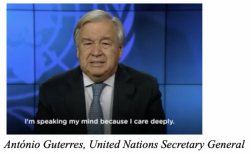 alth.”
alth.”
This hour devoted to “Humanitarian Crises and Mental Health” concluded with short remarks from James Chau, UN Goodwill Ambassador, who briefly explained how he has suffered mental health concerns himself, and therefore encouraged everyone to do something today to help oneself and others.
Suicide Prevention
The hour dedicated to the discussion of “Suicide Prevention” was sponsored by the International Association for Suicide Prevention (IASP). It began with hard hitting statistics and remarks from Dan Reidenberg, Managing Director at the National Council for Suicide Prevention. He stated statistics that about 20 million people attempt suicide every year, with about 800,000 people who carry through with the act. Actions we all can take can make a difference, he said, noting that even just a smile may mean everything to someone who is distressed.
Reidenberg is specifically interested in the role of the media, for example, he bemoaned that Hollywood and Bollywood are not reporting or sharing information about suicide correctly or adequately, and how influential such misinformation can be. A notable example of this, he pointed out, is the Netflix show “13 Reasons Why” where the main character, Hannah, in his estimation, is glorified for having 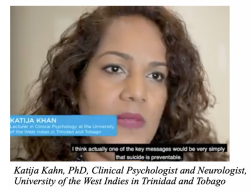 committed suicide.
committed suicide.
The hour on this topic continued with remarks from various experts in the field around the world. Dr. Katija Kahn, clinical psychologist, neurologist, and lecturer in Clinical Psychology at the University of the West Indies in Trinidad and Tobago, stressed that suicide is preventable and one of the best things we can do is emphasize to everyone that it is preventable, and instill hope.
Dr. Ella Arsenman, Research Professor with the School of Public Health, University College Cork, and Chief Scientist with the National Suicide Research Foundation in Ireland explained how 30 years ago we did not see the extent of suicide and self-harm in children as we see now. She elaborated that there is a severe risk of copycat and “contagion” suicide, where people commit suicide after hearing about others completing this act, which causes the statistics to escalate. Drs. Kahn and Arsenman both concluded their remarks with the message that we all must work together to end the suffering.
This hour ended with remarks from Dr. Gil Zalsman, Professor of Psychiatry at Tel Aviv University and Chair of the Israeli National Suicide Prevention Plan. Suicide is a global proble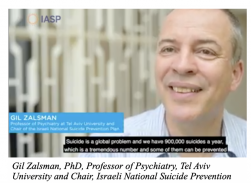 m, he explained, and we need a global effort of experts to stop it. He described a conference in Chenniai by SNEHA, a Suicide Prevention Centre, that was productive because it united experts in the field and collaborated multiple different ideas and theories around suicide prevention. Dr. Zalsman emphasized that we need more experts coming together and strategizing to truly end suicide crises. He also detailed the results of a publication in the Lancet Psychiatry which reviewed papers to prevent suicide in 17 different countries. Each paper had four major themes about how to combat suicide: (1) fight and help depression symptoms; (2) control and restrict the means for suicide; (3) work with and educate students on suicideprevention; and (4) create an integrated chain of care. Altogether, suicide is preventable, he said, if we all work together to protect others and ensure our leaders are giving us the resources we need to survive.
m, he explained, and we need a global effort of experts to stop it. He described a conference in Chenniai by SNEHA, a Suicide Prevention Centre, that was productive because it united experts in the field and collaborated multiple different ideas and theories around suicide prevention. Dr. Zalsman emphasized that we need more experts coming together and strategizing to truly end suicide crises. He also detailed the results of a publication in the Lancet Psychiatry which reviewed papers to prevent suicide in 17 different countries. Each paper had four major themes about how to combat suicide: (1) fight and help depression symptoms; (2) control and restrict the means for suicide; (3) work with and educate students on suicideprevention; and (4) create an integrated chain of care. Altogether, suicide is preventable, he said, if we all work together to protect others and ensure our leaders are giving us the resources we need to survive.
The United States and Mental Health
The hour devoted to the theme of the “United States and Mental Health” started with Dr. Benjamin Miller, Chief Strategy Officer for Viacom/Well Being Trust. He explained that we are at a crucial point in our history with COVID-19, where we have an opportunity to change the inadequate (or “bad” in his words) policies and to increase healthcare coverage for all. “The one and only thing Americans agree on is fixing mental health,” he said, quoting that 91% of registered voters want policy makers to focus on mental health. Yet, he stressed, Congress has failed us. He quoted the Health Mind Survey about the increased prevalence of anxiety, depression, eating disorders and suicidal ideation in the past decade, and statistics that currently, 1 in 3 students in the United States have a clinical mental health concern. Other statistics are that suicide is the 2nd leading cost of death, and 50% of population will experience mental health concerns. He also stressed these statistics will likely go up, in light of the pandemic, economic recession, and political uncertainty. He urged everyone to call on Congress to fix healthcare policies and start providing resources to mental health, immediately.
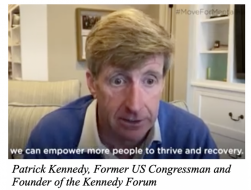 Parallel remarks were made by Patrick Kennedy, Former U.S. Congressman and Founder of the Kennedy Forum. The Kennedy Forum is an NGO that works to drive and inspire change in the United States’ healthcare system. Congressman Kennedy, who has suffered from mental health challenges, addressed the need for whole-person care, saying, “The reality is when people with mental health and physical health conditions are identified early and receive evidence based mental health treatment, improved outcomes and substantial savings are achievable.” He added, “It’s time to change the course and prioritize true integrated care once and for all.” He demanded that medical professionals be trained on how to screen common conditions, and that they work in conjunction with mental health care professionals. Kennedy added that that insurance companies must reimburse people for such care given individuals’ lack of resources and demanded that hospitals modernize their infrastructures to include collaborative care. Having served as a lawmaker in Congress himself, he ended his remarks with a final call on lawmakers to draft and introduce legislation to fund mental health care as necessities.
Parallel remarks were made by Patrick Kennedy, Former U.S. Congressman and Founder of the Kennedy Forum. The Kennedy Forum is an NGO that works to drive and inspire change in the United States’ healthcare system. Congressman Kennedy, who has suffered from mental health challenges, addressed the need for whole-person care, saying, “The reality is when people with mental health and physical health conditions are identified early and receive evidence based mental health treatment, improved outcomes and substantial savings are achievable.” He added, “It’s time to change the course and prioritize true integrated care once and for all.” He demanded that medical professionals be trained on how to screen common conditions, and that they work in conjunction with mental health care professionals. Kennedy added that that insurance companies must reimburse people for such care given individuals’ lack of resources and demanded that hospitals modernize their infrastructures to include collaborative care. Having served as a lawmaker in Congress himself, he ended his remarks with a final call on lawmakers to draft and introduce legislation to fund mental health care as necessities.
Throughout this topic hour, students spoke of their mental health concerns and advocacy. Echoing Congressman Kennedy, they all demanded that lawmakers take action on m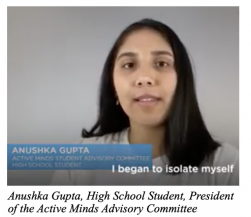 ental health access and care in the United States. Notably, high school student Anushka Gupta, who is President of the Active Minds Advisory Committee at her high school, John L. Miller Great Neck North High School in Great Neck, New York, said, “I work tirelessly to produce an open dialogue about mental health. I’m calling on the change makers of the world to do their part, too. Fund mental health care resources, fund research,b fund early intervention, invest in our future especially since our present has been so hard to navigate.”
ental health access and care in the United States. Notably, high school student Anushka Gupta, who is President of the Active Minds Advisory Committee at her high school, John L. Miller Great Neck North High School in Great Neck, New York, said, “I work tirelessly to produce an open dialogue about mental health. I’m calling on the change makers of the world to do their part, too. Fund mental health care resources, fund research,b fund early intervention, invest in our future especially since our present has been so hard to navigate.”
On a personal note, I found all these presentations very inspiring, especially hearing the comments of young students who are my peers. I agree with the comments that lawmakers should pay more attention to the demands of youth. In fact, we are our future. Regardless of their inaction, tuning in to this event gave me hope because the youth is asking such statements to support mental health, making demands, making their voice heard, and taking action. Perhaps all this will matter, and it will be a different future for the United States and the world once today’s youth become our lawmakers.
The last hour of the event ended with a summary of three main demands to lawmakers:
- There needs to be leadership on mental health care.
- There must be integrative care.
- Lawmakers must invest in resources and build a new healthcare structure in the United States, because the old system does not work.
Connection to the United Nations SDG Goals
In my view, this “Virtual Mental Health March” event is significant because it further proves that world leaders are finally taking mental health and wellbeing seriously. This follows the historic step of including mental health and substance abuse in the United Nations Sustainable Development Agenda, adopted in 2015, specifically in SDG 3 in the UN Agenda 2030 with its 17 Sustainable Development Goals (SDGs) and SDG #3 dedicated to ensuring healthy lives and promoting mental health and well-being for all, adopted at the United Nations General Assembly in 2015, and then the inclusion of mental health in the Universal Health Coverage Political Declaration adopted in September 2019.
I note that leaders around the world have committed to “prevention and treatment of noncommunicable diseases, including behavioral, developmental and neurological disorders, which constitute a major challenge for sustainable development” (WHO, 2014). Therefore, in my view, the fact that there were many representatives from the United Nations present at this Virtual March -- even the Secretary-General himself -- proves that mental health has not been forgotten and is becoming an increasingly priority issue, even within the chaos of COVID-19.
Personal Reaction and Relevance
I chose to report on this event because World Mental Health Day has always been a day I have recognized in my past employment and volunteer experiences. Also, I am a full believer and advocate for the mission of this event, reflected in many parts of my personal and professional life. That said, when Christie Kesner of UnitedGMH spoke to our class, I felt really inspired by the work she was doing, and I wanted to get further involved. I immediately reached out to her and asked if there was any way myself and my organization could collaborate with her and UnitedGMH. My organization is an upcoming NGO called Believe New York focused currently on New York City, New York with a national and international vision. Believe New York connects individuals and families in need to the resources they deserve through a 24/7 email and phone service. We also provide free donation delivery services to local shelters and food pantries through our “Food First Program” and free counseling to all people through our “Open Space”. I am grateful that my professor, Dr. Judy Kuriansky, brought the UnitedGMH experts to speak to our class, that Sarah Kline have such a complete and inspiring overview and that in my further contact, following up with UnitedGMH’s Christie Kesner, that she recommended that I participate in the Virtual Mental Health March and become aware of the global issues in mental health. It was a great start. Therefore, I saw tuning in to, and reporting on, this event as an excellent opportunity to learn more and to become more engaged in the event epitomized by World Mental Health Day and in the network of all people at all levels who care about these issues as I do.
While I saw much of the 24 different hours of the Virtual Mental Health March, I chose to report on the hours that focused on the issues about Youth, LGBTQI+, Suicide Prevention, Humanitarian Crises and Mental Health in the United States, because those topics are most meaningful and relevant to me and to my career. As a young bisexual American woman, who has experienced suicidal ideation, and has come close to attempting to end my life in the past, I wanted to learn more about youth mental health, LGBTQI+ mental health, mental health in the U.S., and suicide prevention. I chose to report on the Humanitarian Crises and Mental Health hour as well because in my future I aspire to become a Public Servant and Trauma Psychologist and to focus my leadership, care, and conduct research on individuals and families who have experienced loss, trauma, violence, disasters, extreme poverty and/or hardship around the world. I was curious to learn more about how a person’s mental health is impacted after a crisis and how overall these populations are coping with the Coronavirus pandemic. For my professional and personal life, it was helpful to learn what people around the world need, and what they are demanding of our leaders, for real change in mental health access and care.
All and all, I was very pleased with the event and learned a lot more about the specific demands that people around the world have towards mental health access and care. This event certainly expanded my knowledge in all these topic areas mentioned, and more, that I did not specifically report on here, for example, the issues of inclusion and mental health, and the challenges faced by thousands of people around the world who are chained in cages and held in isolation because of their mental illness. Through joining this event and reporting on it, I also learned a lot more about my own identity and my risk factors, and also about the mental health of populations I want to work with the most in my future. I am thankful I attended this event and look forward to more events like this in the future.
Get Involved - Global Mental Health Action Network
Thankfully, all of the hours/segments from the Virtual Mental Health March are listed on the “Speak Your Mind” Facebook and United for Global Mental Health’s YouTube channel (listed below). I pass on Christie Kesner’s recommendation to others, to tune in to the event. I also encourage others to join the Global Mental Health Action Network sponsored by UnitedGMH. As I pointed out earlier, the Global Mental Health Action Network is a global joint advocacy effort focused on uniting everyone in the mission for better mental health access and care for all. Joining is simple, by just filling out the questionnaire I have noted below. Then be sure to take advantage of being part of the network of these varied groups and people all dedicated to advancing mental health. I strongly urge you to participate in their events and read their newsletters and updates as they come. The only way mental health can improve around the world is if we all come together and advocate for change. We need everyone to advocate and work towards providing adequate mental health care and access to all.
More Information
- Twitter: @gospeakyourmind
United for Global Mental Health
- Youtube
- Twitter: @UnitedGMH
Christie Kesner, United for Global Mental Health Policy Coordinator):
- Email: christie@unitedgmh.org
- Twitter: @christiekesner
The Global Mental Health Action Network
EVENT SUMMARY:
Title: Virtual Mental Health March
Commemoration: World Mental Health Day
Date/Time: October 9-10, 2020, 24-hours, beginning October 9, 7PM EST
Location: Online, Speak Your Mind’s Facebook and United for Global Mental Health’s YouTube Channel.
Host Organization: United for Global Mental Health
Topics Represented: Humanitarian Crises, Dementia, Suicide Prevention, Inclusion, Youth, LGBTQI+, and the NGO, Project Unsung
Countries Represented (by speakers): United States, Tonga, New Zealand, Australia, Indonesia, Philippines, Nepal, India, Sri Lanka, Pakistan, South Africa, Nigeria, Sierra Leone, Liberia, Ghana, Argentina, and Peru.
References
Merlo, M. (2020, September 3). World Mental Health Day: 10 October 2020. World Federation for Mental Health. https://wfmh.global/world-mental-health-day-10-october-2020/
Speak Your Mind. (2020, October 16). March for Mental Health with Us. March for Mental Health. Access at http://marchformentalhealth.com
Worldometer. (2020, November 5). Live Coronavirus Meter. https://www.worldometers.info/coronavirus/
World Federation for Mental Health. (2020, April 6). World Mental Health Day History. World Federation for Mental Health. https://wfmh.global/world-mental-health-day/
World Health Organization. (2014, January 14). Mental health included in the UN Sustainable Development Goals. World Health Organization Mental Health. https://www.who.int/mental_health/SDGs/en/
World Health Organization. (2001, September 28). The World Health Report 2001: Mental Disorders affect one in four people. World Health Report. https://www.who.int/news/item/28-09-2001-the-world-health-report-2001-mental-disorders-affect-one-in-four-people
Reported by Nicole K. Bulanchuk, a mental health advocate and student pursuing her master’s degree in the Department of Clinical Psychology, Columbia University Teachers College, and a student in Professor Judy Kuriansky’s class on “Psychology and the United Nations.” In addition to Nicole’s academic work, she has extensive background in a variety of areas including research, leadership, clinical methods, and public advocacy. Throughout her experience, she has developed advanced skills in NGO management and fundraising, public speaking, interpersonal listening and communication, crisis intervention, counseling, mentoring and critical thinking. She aspires to become a Public Servant and Clinical Psychologist, with a specialization in trauma, resilience, PTSD and suicide in order to not only research and treat the individuals and families whom have undergone the most devastating losses, but also to make the biggest impact she can in areas of social justice. Overall, she is devoted to helping all people achieve happiness and security and reach their full potential in life.
Cite this article as: Bulanchuk, N. K. (2020). World Mental Health Day 2020: A 24-hour Virtual March for Mental Health. International Association of Applied Psychology: IAAP at the United Nations. https://iaapsy.org/iaap-and-the-united-nations/reports-meetings-events/world-mental-health-day-2020-a-24-hour-virtual-march-for-mental-health/

